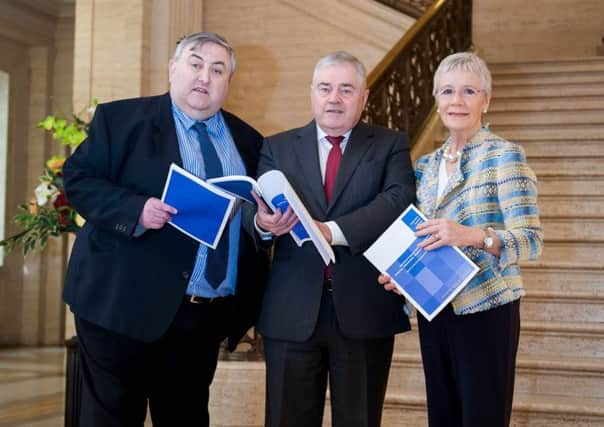Radical changes to MLA salaries, expenses and pensions announced


“The panel has made radical changes to expenses that will provide professional, fair and equitable support for each MLA, and will enhance public confidence in our politicians.
“Our decisions set the rates for salaries, pensions and expenses to support each MLA and their work for the next five years. The panel expects that these decisions will amount to savings of between £1.5 million and £2.0 million in the Assembly’s budget over the next five years,” said Pat McCartan, Chairman of the panel.
Advertisement
Hide AdAdvertisement
Hide AdThe major changes are the scrapping of the current systems for office cost expenses and for mileage and subsistence, which will be replaced with separate capped amounts for travel, office rents and rates, and for employment of support staff.
Salaries for MLAs, Ministers, and some office holders, will increase slightly based on inflation being more than 1%, but will be partly offset by higher pension contributions.
The main points are:
MLA’s salary shall increase by £1,000 to £49,000 and by £500 each April if inflation (CPI for previous September) is greater than 1%.
MLA Pension contributions will rise from a minimum of 7% to 9%, and be based upon 1/50th for each year of career average earnings. There will be some protection to retain 1/40th for those over 55 on April 1, 2015.
Advertisement
Hide AdAdvertisement
Hide AdRent and rates for constituency offices will be capped at £8,500 (maximum rent allowed) plus 40% for rates. There will be lower amounts for shared offices with other politicians and only one constituency office will be funded. All payments are conditional on full compliance with new signage requirements within three months.
MLA’s who rent offices from their political parties or connected individuals and groups will no longer be eligible to reclaim expenses for rent and rates.
Travel allowances are fixed for each constituency for each MLA, and will vary from £850 per year to £7,500, depending on distance from Stormont. To qualify for the full allowance, MLAs must attend Parliament Buildings on at least 72 days a year and record their attendance. A deduction of 1% of the allowance shall be made for each day’s attendance less than 72 days.
Employment of Support Staff. MLAs shall be able to claim an annual allowance of up to £50,000 for employing up to two full-time or equivalent part-time staff in their constituency office or at Stormont. ERNI and a new employer pension cost of 5% shall be paid in addition to the £50,000 cap.
Advertisement
Hide AdAdvertisement
Hide AdA new salary structure will be introduced to ensure that no member of support staff is paid less than the Living Wage Foundation living wage of £8.25 per hour, rising each year to meet the £9.20 per hour minimum set by the Chancellor for 2020. Support staff may be eligible for annual performance uplifts of £250 a year to reach the top of their salary scale.
Recruitment. All future vacancies for MLA support staff shall be filled on the merit principle, requiring open competition.
Full details are available on website www.ifrp.co.uk